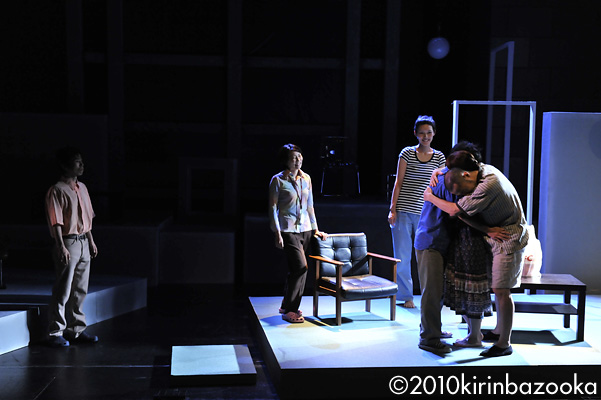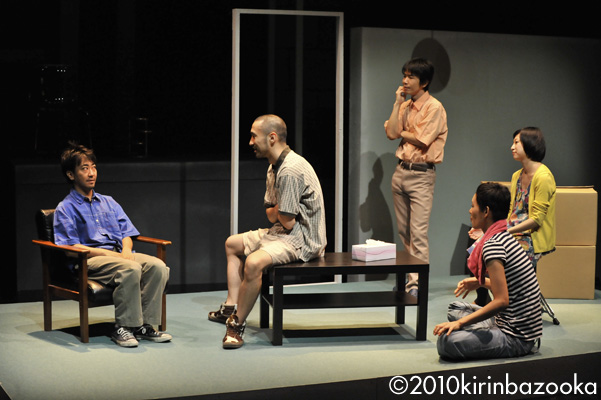Azumi is a doctor who has recently quit his hospital job to open a private practice in counseling. Come to help him move are two former classmates, Shimauchi and Nakayama and a nurse named Kotobuki who has worked with Azumi at the hospital. The fiancé Kotobuki is now living with, a policeman named Sasaga, is also a former classmate. Shimauchi has taken over his parents’ nursery school and runs it with his wife and his younger brother. Nakayama works as a model in Tokyo but has returned here to her hometown for a while. All of a sudden Niimura appears. Shimauchi has invited him to come, having met him recently by chance at the Matsuki Hospital where Azumi has been working.
Assuming the role of a narrator, Shimauchi’s younger brother, Natsuo, explains the relationships between these former classmates and then announces the beginning of the play.
The scene changes to Matsuki Hospital. It is some time in the recent past. Shimauchi’s wife, Marue, is talking with the policeman Sasaga and his superior, Wada. Marue’s brother-in-law, Natsuo, has disappeared from the hospital where he has been hospitalized after a motorcycle accident and she has been explaining the circumstances in preparation for filing a missing person search request. A doctor named Kanbayashi who happens by joins in the conversation.
The play returns to Azumi’s house. Niimura has a memory disorder that he says is the after-effect of the fall when he jumped off the school roof in the spring of his first year of middle school. At the time, there was an uproar in the community because of rumors that it had been bullying by Shimauchi that caused Niimura’s jump. When the two happened to meet again at the hospital after many years, Shimauchi tried to get Niimura to admit that there had never been any bullying on his part, but the more they talk the more discrepancies emerge in the recollections of the classmates. The subjects of their recollections include things like Sasaga’s dream of what he wanted to be when he grew up, the works Azumi folded as a member of the school’s origami club, Niimura’s mild case of kleptomania and whether there had been any bullying in their class.
Further confusion results during the conversation when Niimura begins talking with subjects and objects reversed, as if he is taking other people’s memories or experiences as his own.
We soon learn that Niimura is not the only one with problems. All of the characters have problems and issues of their own that are constraining them.
Due to Sasaga’s exceptionally poor memory, Kotobuki has become suspicious that he is cheating on her, even though they are just about to be married.
Nakayama still has affections for Shimauchi, who she had a crush on in high school.
The couple Shimauchi and Marue have lost their only son, Souta, in a pool accident at their nursery school. Since that fatal accident, Marue has for some reason developed a strong affection for her husband’s younger brother, Natsuo. Shimauchi has become bitter and insecure at the sight of her doting on Natsuo in the hospital.
Natsuo has run up a large debt due to his gambling and has gotten his lover, the nurse Isami, to help pay it off, and he is now trying to get money out of Marue as well. When Natsuo returns to the hospital after his disappearance, Shimauchi punches him and says, “I’ll pay off your debt, but in return I want you to leave and never show your face in front of us again!” It is Niimura’s witnessing this scene that results in his reunion with Shimauchi.
As for Niimura, he has been through the devastating experience of being led by his mother into a double suicide attempt as a result of her extreme pessimism about the future due his mental infirmity. His mother died but Niimura survived.
After Natsuo’s second disappearance, the police receive an anonymous call informing them that there is a hidden video spy camera in place at the Shimauchi’s nursery school. A month later, Marue is brought in to the hospital after taking an overdose of sleeping pills.
Natsuo appears once again in the role of narrator. He tells the reason why he fell into dept, the fact that he was leeching Isami for money to pay off the debt, how he got the idea of placing a spy camera at the nursery school but failed to sell the videos of the children on the internet or to blackmail the children’s mothers to buy the tapes, the fact that he asked Marue to take down the camera before his second disappearance and that now he plans to write all this in a suicide note and then kill himself.
Now at wits end with all his troubles, Shimauchi schemes to take advantage of Niimura’s memory disorder. He tries to force Niimura to approach Marue as their lost son, Souta. When Marue comes home, another aspect of Niimura’s distorted memory is revealed.
In another area, we see a realistic re-creation of a scene of parting between Azumi and his lover that Niimura has witnessed. The woman Azumi is parting with, whom Niimura has believed to be Isami, actually turns out to be Marue. A relationship had begun between the two while Marue was in counseling, but only Azumi is seriously in love. As he is confessing his love to Marue, Shimauchi shows up and learns of his wife’s infidelity.
Once again there is a narration by Natsuo. He explains the situation he finds upon returning to the town several years later. He reports that he has found Isami already married and that he gets Shimauchi’s forgiveness after receiving a few brutal punches. Later, he tells about Azumi and the others.
In the counseling room we find a gathering the people involved, as well as Sasaga and Kotobuki, who would normally have no business there. After a silence, each of the people begins to reveal things they have been hiding.
Marue says she was the one who actually reported the spy camera. Azumi insists that he loves Marue but she rejects his love. Kotobuki derides Marue for her infidelity. As Shimauchi tries to stay calm, Nakayama shouts at him, “Why don’t you admit how much you love your wife!” Kanbayashi tries to encourage Azumi and Marue to apologize for what they have done, but Marue insists that it is Shimauchi who should apologize to her.
“Do you remember what you said when our child died? You said it was better that our own child died in the pool accident rather than one of our nursery’s children!”
In helpless frustration Shimauchi says, “Beat me if you want. Until you feel satisfied.” Marue raises a fist to beat him but then changes her mind and kicks him instead. She kicks him hard, again and again. Shimauchi begins to crumble in pain.
Then suddenly, Niimura cries out, “Mother!” Niimura wraps his arms around Marue and clings to her. As if to his own mother he repeatedly thanks her for giving birth to him and apologizes to her for being such an unworthy son. When Shimauchi tries to pull the two apart, Niimura calls him, “Father” and clings tightly to him as well, creating the incongruent appearance of a family of three locked in a loving embrace. Oddly, however, that embrace proves soothing and the troubles that have tormented the three appear to melt away.
The scene shifts to Azumi’s house several months later. In the time that has passed, Niimura has come to live with Azumi, and Nakayama has also managed to get lodging here. Kotobuki, now heavy with child, and Sasaga arrive. They have come to return a giant paper airplane that they say Azumi had folded when they were in middle school and secretly delivered to the home of Sasaga, who at the time dreamed of becoming a pilot. Seeing the origami airplane leads Nakayama and Azumi to imagine a different reason for Niimura’s mysterious fall from the roof. In the end, however, no one knows the truth.
As if to return everything to a plank sheet of paper, Nakayama unfolds the airplane and then suggests that Azumi refold it. As Azumi approaches the paper with apparent perplexity, Nakayama looks on with a smile.




